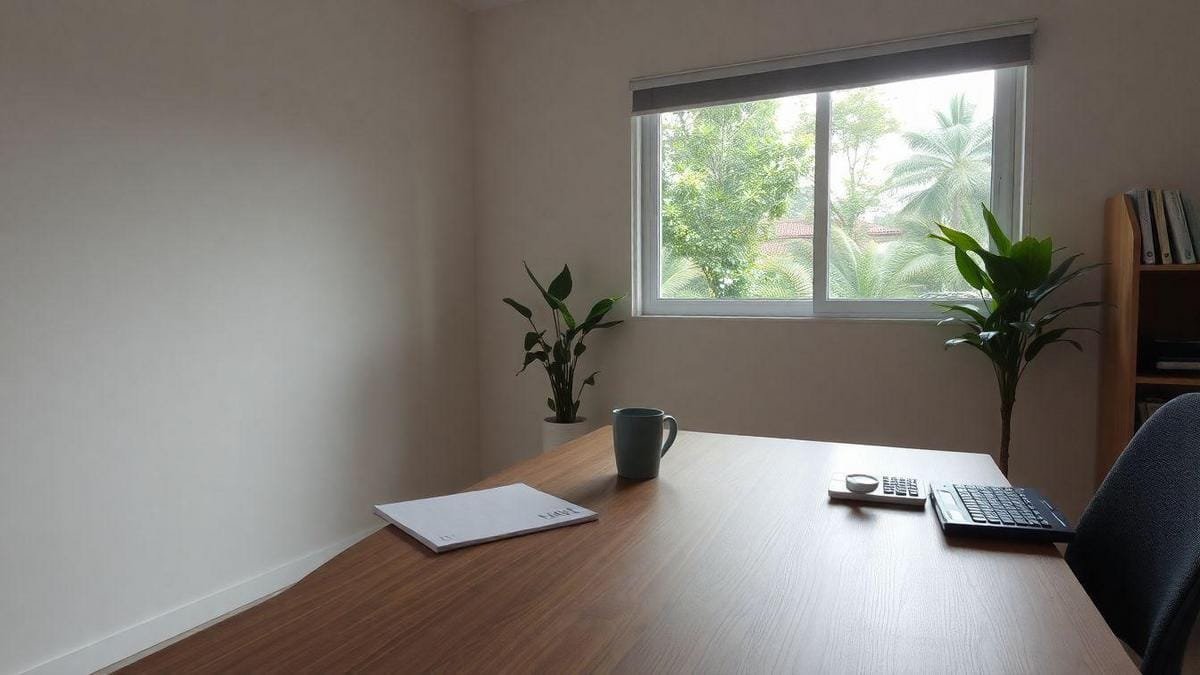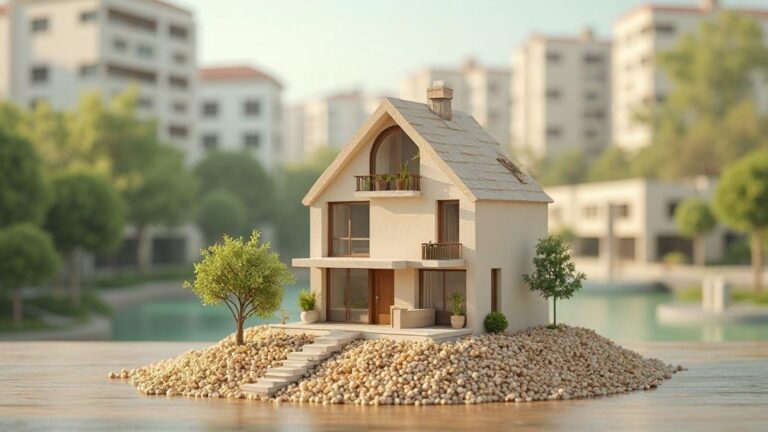Financial preparation for major real estate investments is very important! In this article, you'll find out how to prepare for buying very large and expensive houses or plots of land. We'll talk about how to make a good financial planning, which tools to use and how to evaluate real estate. You will also learn about financing and how to negotiate the best price. Let's go and learn all about how to take good care of your money and property!
Main conclusions
- You need save money to buy a house.
- One good credit can help you get a good loan.
- Think about how much you can pay every month.
- Research the houses before you decide.
- Ask adults who understand real estate for help.

What is financial preparation for major real estate investments?
Understanding financial preparation
Financial preparation is like planning a big party. You need to know how much money you have, how much you're going to spend and what you need to buy. When you want to buy a property, such as a house or an apartment, it's very important to do this. You should look at your savings, their expenses and how much you can pay every month.
Why is it important for high-value properties?
When you want to buy a property that costs a lot of money, such as a large house, it's like climbing a high mountain. You need a good plan to get to the top. If you don't prepare, you could end up no money or with a house you can't afford.
Here are some reasons why financial preparation for major real estate investments é super important:
- You know how much you can spend.
- You avoid surprises with high bills.
- You can get a good loan at the bank.
Benefits of financial preparation
Financial preparation brings many benefits. Let's look at some of them in a table:
| Benefits | Description |
|---|---|
| Security | You feel safer knowing that you are prepared. |
| Planning | You can plan your expenses better. |
| Opportunities | You can take advantage of good offers when they appear. |
| Tranquility | You feel calmer knowing that everything is under control. |
With good financial preparation, you can realizing the dream to own a property without worrying about problems in the future.
How do you plan your finances effectively?
Steps to good planning
Make a financial planning it's like putting together a jigsaw puzzle! You need to know where each piece fits. Here are some simple steps to help you:
- Find out how much you earnLook at your allowance or the money you receive.
- Write down your expenses: What do you spend? Food, toys or outings? Write it all down!
- Get a quote: Separate what you can spend and what you should keep.
- Set goalsWhat do you want to buy? A new toy or a game?
- Review your planLook at your planning from time to time and see if you need to change anything.
Tools that can help you
There are some tools that can be very useful! Here are a few:
| Tool | What do you do? |
|---|---|
| Finance apps | They help control spending. |
| Spreadsheets | You can create your own budget. |
| Notebooks | Write everything down by hand. |
The importance of having a plan
Having a financial plan is like having a map! It helps you know where to go and what to do. If you want to buy something big, like a house or a car, it's very important to have a good plan. With a plan, you can:
- Saving money: Save for what really matters.
- Stay calm: Know that you are prepared for the future.
- Making dreams come true: Buy what you've always wanted.

Property valuation: What you need to know
How to evaluate a high-value property
Valuing a property from great value may seem like trying to put together a complicated jigsaw puzzle. But don't worry, we'll make it simple. To begin with, you should look at a few main points:
- LocationWhere is the property? If it's close to schools, parks or stores, this can increase its value.
- SizeHow many bedrooms and bathrooms does it have? A larger property is generally worth more.
- Condition: Does the property need repairs? A well-kept place can be worth more.
- Market: How are property sales in the area? If many are being sold, this could affect the value.
Factors influencing evaluation
There are factors that can change the value of the property. Here is a table to help you understand better:
| Factor | What does it mean? |
|---|---|
| Location | Where the property is. |
| Size | How many bedrooms and bathrooms. |
| Condition | Whether the property is new or in need of repair. |
| Market | Many properties are being sold in the area. |
| Features | Special things, like a swimming pool or a beautiful garden. |
Tips for an accurate assessment
Here are a few tips for you to make a proper assessment:
- Search: See similar properties in your area.
- Ask for help: Talk to a real estate expert.
- Write everything down: Make a list of everything you see in the property.
- Consider the futureThink about whether the area will grow or change.
Real estate financing: Options available
Types of financing for major investments
When you're thinking of buying a house or apartment, you may need borrowed money. This is called financing. There are a few ways to get this money. Let's take a look at a few options:
- BankYou can go to the bank and ask for a loan. The bank will lend you the money, but you have to pay it back with a little extra, which we call interest.
- Credit unions: These are like banks, but they are set up to help people in the community. Sometimes the interest rates are lower here.
- Direct financing with the builder: Some companies that build houses also help with financing. This way, you pay the builder directly.
How to choose the best option for you
Choosing the best way to get the money can be difficult, but here are some tips that can help:
- Look at the interest ratesThe less interest you pay, the better!
- Think about your budget: See how much money you can spend each month.
- Compare the options: Don't choose the first one that comes along. See several options!
Comparing interest rates
Here is a table for you to better understand the interest rates for each option:
| Type of Financing | Interest Rate (1TP3Q) |
|---|---|
| Bank | 8% |
| Credit union | 6% |
| Financing with a construction company | 7% |
With this table, you can see that credit union has the lowest interest rate. This can make a big difference to the amount you pay!

Buying strategies for high-value properties
What to consider before buying
Before you buy a high-value property, you need to think about a few important things. Here are some of them:
- Location: The location of the property is very important. You want it to be close to schools, parks and stores.
- BudgetHow much money do you have to spend? It's good to know this before looking at properties.
- Conditions: The property must be in good condition. Check if there are any repairs to be done.
- DocumentationMake sure all the paperwork is in order. This will avoid problems in the future.
How to negotiate the best price
Negotiating the price of a property can be like a game. Here are some tips for getting a good deal:
- SearchLook at similar properties in the same area. This helps you know if the price is right.
- Be patientDon't rush. Sometimes waiting can make the seller lower the price.
- Offer lessStart with a lower price than you're willing to pay. This gives you room to negotiate.
- Show interest: Saying that you really like the property can help convince the seller.
| Negotiation tips | What to do |
|---|---|
| Search | Look at similar properties |
| Being patient | Wait and see if the price drops |
| Offer less | Start with a low price |
| Show interest | Say you like the property |
Common mistakes to avoid
Watch out! There are some mistakes you should avoid when buying a high-value property:
- No inspection: Always check the property before buying. There may be hidden problems.
- Ignore feesIn addition to the price of the property, there are other fees, such as taxes and notary fees. Don't forget them!
- Haste in buying: Buying a property is a big decision. Don't rush into it. Think carefully before you decide.
- Not consulting a specialistSometimes it's good to talk to a broker or lawyer. They can help you avoid problems.
Asset management and cost savings
What is asset management?
Asset management is like looking after your valuable things. Imagine you have a very special toy. You want to keep it clean and in good condition, right? Asset management works like that, but with things like houses and land. It's about care e maintain everything you own so that it doesn't lose value. This helps you to make money and don't overspend.
How to save with real estate investments
When you want to buy a house or apartment, it's important to think well. Here are some tips to help you save money:
- Search: Look in different places to find the best price.
- NegotiateDon't be afraid to ask for a discount.
- Check: See if the house needs repairs. Sometimes fixing something can cost a lot of money.
| Tip | What to do |
|---|---|
| Search | Look in several places |
| Negotiate | Ask for a discount |
| Check | See if you need repairs |
Keeping your assets in good shape
After buying your home, it's important to take care of her. Here are some ways to keep your assets in good shape:
- Regular cleaning: Keep the house clean and tidy.
- Small repairs: Fix small things before they become big problems.
- Garden care: A beautiful garden can increase the value of your home.
Remember, taking care of what you have is like taking care of a little plant. If you water it and give it love, it will grow and be beautiful!
Conclusion
Financial preparation is like a map that guides you adventure to buy a property. With the tips and steps you've learned, you now know how to save, plan e evaluate what really matters. Remember that every step counts, and with patience and care, you can achieve your dream of having your own place. Don't forget to search and ask for help when you need it! Now that you're more prepared, how about exploring more about finance and investments? Visit Renovation Tips and keep learning!
Frequently asked questions
What is financial preparation for high-value real estate?
Financial preparation for high-value real estate is planning how much money you need to buy or invest in an expensive house or building.
Why should I worry about this?
You have to take care not to spend more than you can afford. That way you avoid debt and stress!
What are the first steps to prepare?
Start saving money. Make a budget and see where you can save.
How much money do I need to save?
Most people save at least 20% of the value of the property. This helps you buy without worrying!
What is a budget?
A budget is like a plan. It shows how much money you have and how you want to spend it.
How can I save money?
You can cut out unnecessary expenses, such as snacks or toys you don't use!
What are large real estate investments?
Major real estate investments are purchases of houses or buildings that cost a lot of money.
How do I know if I'm ready to buy?
If you have a good plan and money saved, you're almost there!
Do I need professional help?
Sometimes! Consulting a specialist can give you important tips.
What is an interest rate?
It's the extra money you pay when you take out a loan. The smaller, the better!
What is financing?
Financing is when you borrow money to buy a house and pay it off gradually.
How can I improve my credit?
Pay your bills on time and don't get into too much debt. That way, your credit will be fine!
Where can I learn more about financial preparation?
You can read books, watch videos or ask people who know about the subject!

Welcome to our passion for engineering blog! Here, I go behind the scenes of great buildings, explore the innovative technologies that shape our world and celebrate the genius of engineers who push the boundaries of creativity. From majestic bridges to towering skyscrapers, each construction project is a fascinating story of planning, execution and impact. Join me on this journey through the universe of engineering, where precision meets art and functionality rises to beauty.




